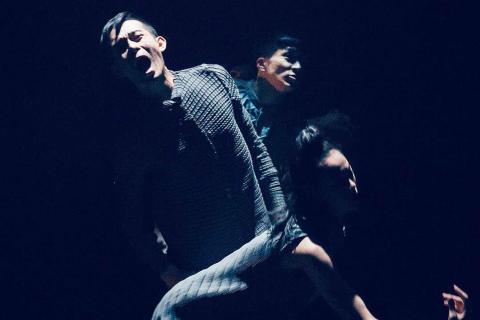Young Taiwanese choreographer Lai Hung-chung (賴翃中) has had a very busy couple of years, winning several competitions in Europe, as well as one in Japan, and founding his own company in May 2017.
Lai and his dancers have been to 30 cities in nine countries, and have given 63 performances in the past two years.
However, while audiences in other nations have had several chances to see his work, people in Taiwan have had fewer opportunities.

Photo courtesy of Lin Cheng-yi
So tomorrow night, Hung Dance (中翃舞製作) will attempt to remedy that with a reprise of Boundless (無盡 天空), his first full-length work, at the New Taipei City Arts Center.
Boundless grew out of a shorter duet, Birdy, which won Hung first prize at the 16th Burgos-New York International Choreography Competition in Spain in July 2017. It premiered in Madrid on Oct. 17 last year as part of the “Made in Taiwan” showcase at the Circulo de Bellas Artes, and had its Taiwan premiere at the National Experimental Theater in Taipei in early January.
In Birdy, Cheng I-han (鄭伊涵), wearing a headset of long pheasant feathers, confronted Chien Lin-yi (簡麟懿), who represents confinement in a dance about the inner desire to escape from one’s reality and search for meaning in life.
In Boundless, Hung further explores the pull between the self and the super-self; the search for freedom and the limitations of life.
In addition to Cheng, the cast on Saturday includes Wu Meng-ting (吳孟庭), Yang Hsin-ching (楊雅晴), Li Zong-lin (李宗霖), Li Jya-ming (李家名) and Huang Yu-hsuan (黃于軒).
Hung said the constant travel over the past two years, while enjoyable, has been wearying, and he plans to spend more time at home in the next year or so — after a trip that will take his company to three European cities and New York City next month. Hopefully, that will mean more chances for local audiences to see his work.
■ Tomorrow at 7:30pm at New Taipei City Arts Center (新北市藝文中心演藝廳), 62 Jhuangjing Rd, Banciao District, New Taipei City (新北市板橋區莊敬路62號)
■ Tickets are NT$500 to NT$1,000; at the NTCH box offices, Eslite ticket desks, online at www.artsticket.com and at convenience store ticket kiosks

In the March 9 edition of the Taipei Times a piece by Ninon Godefroy ran with the headine “The quiet, gentle rhythm of Taiwan.” It started with the line “Taiwan is a small, humble place. There is no Eiffel Tower, no pyramids — no singular attraction that draws the world’s attention.” I laughed out loud at that. This was out of no disrespect for the author or the piece, which made some interesting analogies and good points about how both Din Tai Fung’s and Taiwan Semiconductor Manufacturing Co’s (TSMC, 台積電) meticulous attention to detail and quality are not quite up to

April 21 to April 27 Hsieh Er’s (謝娥) political fortunes were rising fast after she got out of jail and joined the Chinese Nationalist Party (KMT) in December 1945. Not only did she hold key positions in various committees, she was elected the only woman on the Taipei City Council and headed to Nanjing in 1946 as the sole Taiwanese female representative to the National Constituent Assembly. With the support of first lady Soong May-ling (宋美齡), she started the Taipei Women’s Association and Taiwan Provincial Women’s Association, where she

Chinese Nationalist Party (KMT) Chairman Eric Chu (朱立倫) hatched a bold plan to charge forward and seize the initiative when he held a protest in front of the Taipei City Prosecutors’ Office. Though risky, because illegal, its success would help tackle at least six problems facing both himself and the KMT. What he did not see coming was Taipei Mayor Chiang Wan-an (將萬安) tripping him up out of the gate. In spite of Chu being the most consequential and successful KMT chairman since the early 2010s — arguably saving the party from financial ruin and restoring its electoral viability —

It is one of the more remarkable facts of Taiwan history that it was never occupied or claimed by any of the numerous kingdoms of southern China — Han or otherwise — that lay just across the water from it. None of their brilliant ministers ever discovered that Taiwan was a “core interest” of the state whose annexation was “inevitable.” As Paul Kua notes in an excellent monograph laying out how the Portuguese gave Taiwan the name “Formosa,” the first Europeans to express an interest in occupying Taiwan were the Spanish. Tonio Andrade in his seminal work, How Taiwan Became Chinese,